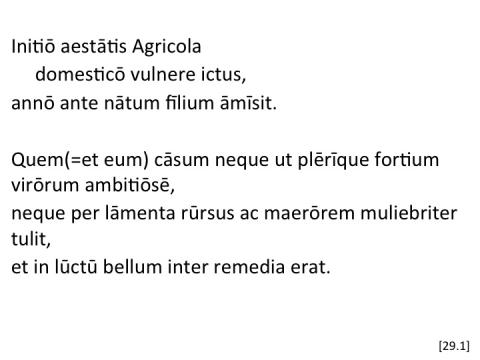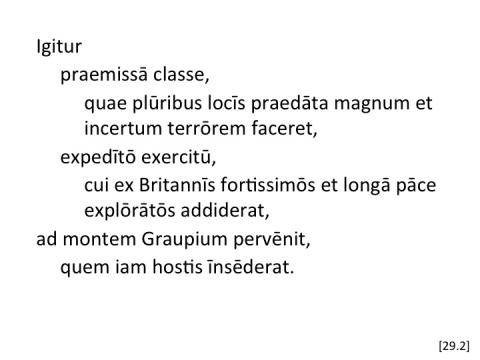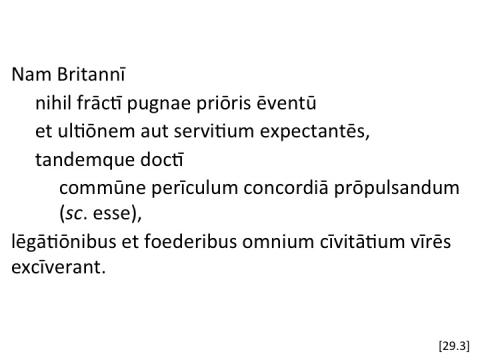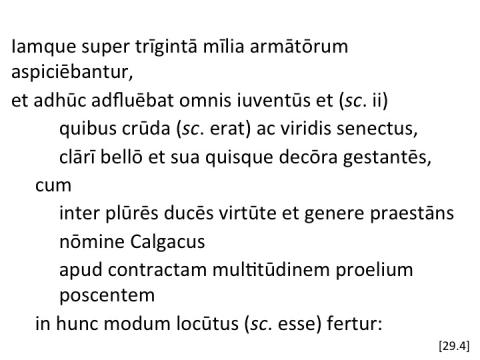Overview: Death of Agricola's infant son; he bears his affliction with becoming moderation; he advances against the enemy who have mustered in force at the Graupian Mountains under the leadership of Calgacus. (Stuart); this chapter begins on f. 60r of the codex Aesinas.
29.1
initiō aestātis: 83 CE. (for the date see Introduction). (Damon); the seventh summer. (Gudeman)
ictus ... āmīsit: ictus refers to the same event and the same time as amisit. ... Here the verb explains the participle, and we should have expected ictus est, amisso filio. (Pearce) [A&G 493]; the construction is a Graecism. (Gudeman)
plērīque fortium virōrum ambitiōsē: i.e. unlike many brave men, Agricola did not ostentatiously display his sorrow, ambitiose being often used in this sense. Hitherto plerique fortium virorum, etc., was taken in an ironical sense, with direct reference to the Stoics, but this is incompatible with the antithesis in muliebriter, nor does Tacitus elsewhere ridicule the Stoics for not practicing what they preached. (Gudeman) fortium: used sarcastically of the Stoics, who made a parade of indifference to misfortune. (Pearce) ambitiōsē: i.e. with an eye to effect. Fortium is not ironical, but is meant in good faith. Just as good men are not indifferent to fame (see ch. 9.2), so they might not be blind to the fact that self-control in time of affliction excites admiration; desire to win praise for a show of fortitude might well govern their behavior to some extent. (Stuart)
per lāmenta ... maerōrem: words denoting pain or sorrow are frequently combined in synonymic groups. Here the first more particularly expresses open, the second silent sorrow. (Gudeman)
rūrsus: "on the other hand." (Stuart)
29.2
praedāta ... faceret: the past participle of deponent verbs is quite regularly used of time simultaneous with that of the finite verb. (Pearce) [A&G 190b]
incertum: "perplexing," because they did not know where the enemy would strike next. (Stuart) incertum terrōrem: here the uncertainty should strictly be attributed to the Britons, not to their alarm. This “suggestive” use of adjectives is common in poetry, e.g. caecus pulvis, “dust that makes blind.” But many such expressions have passed into ordinary language, e.g. our “joyful surprise” and “happy hours.” (Pearce)
expedītō: i.e. without heavy baggage, such as artillery. (Pearce)
fortissimōs et longā pāce explōrātōs: best taken as referring to two classes of natives. Agricola chose those British auxiliaries who had proved themselves specially brave. To these he added some others from the long since pacified tribes of southern Britain, whose loyalty had been tested and who had but recently been conscribed. The traditional interpretation, identifying the two, involves a contradiction, for fortitude is incompatible with longa pax. See ch. 11.2. (Gudeman); these would be the inhabitants of southern England. By a rule of procedure ordinarily observed by the Romans, recruits of one province were sent to another to serve. Thus German troops were largely used in Britain. (Stuart)
Graupium: the locality is not elsewhere mentioned and can not be identified. We know only that it was somewhere north of the Clyde-Forth lines. (Stuart); the modern name “Grampians” perpetuates the false reading of the earliest printed text (that of Puteolanus). For the site of the battle I have accepted the suggestion of Sir James H. Ramsay. He traces Agricola's advance by a line of camps of about 40 to 50 acres, which would correspond with the numbers of his troops. The northernmost of these camps is at Delvine, and here the battlefield may be placed. (Pearce)
29.3
pugnae priōris: the night attack described in ch. 26. (Stuart)
expectantēs: “prepared for.” (Stuart); “looked to,” in a general sense, without implying a hope to be realized, which would not suit servitium. (Gudeman)
tandem doctī, etc.: compare with ch. 12.2. (Gudeman)
concordiā prōpulsandum: sc. esse. (Damon); a departure from their usual policy. See note on ch. 12.1. (Stuart)
lēgātiōnibus et foederibus: the et is epexegetic, the two terms standing in causal relation. The solemn compact, mentioned in 27.2, must therefore, as legationibus here implies, be understood of other tribes in the immediate neighborhood, if not actually of various clans of one and the same tribe. (Gudeman)
29.4
iamque, etc.: notice the vivid use of the “picturesque” imperfect tense which brings the scene before us, and the poetical color given to the description by the borrowing of Vergil's cruda ... viridisque senectus, Aen. 6.304. (Pearce)
trīgintā mīlia: a more conservative estimate of a barbarian army than one usually finds in the Roman historians. Before the battle the strength of the enemy was somewhat increased. (Stuart)
armātōrum: the regular army. To these are added, in view of the emergency, the veterani and the iuvenes ingenui, probably those who had not yet gone through the solemn investiture with arms at the folk-moot or assembly. (Gudeman)
adhūc: “and still.” (Stuart); “in addition to these.” So frequently used in Tacitus, but rarely elsewhere. (Gudeman)
adfluēbat: a Vergilian phrase, e.g. Aen. 2.796-7, ingentem comitum adfluxisse ... numerum. (Gudeman)
crūda ac viridis senectus: sc. erat. (Damon); on Tacitus's admiration of Vergil, see Introduction, p. xxiv. (Stuart)
decora: "insignia of valor." (Stuart)
praestāns nōmine Calgacus: "when one Calgacus by name, distinguished among the several chieftains." The phrase nomine Calgacus is apparently an exclusively Tacitean expression and is used by him very often, but only in the case of non-Romans. Calgacus owes his immortality to this solitary mention. (Gudeman)
in hunc modum locūtus fertur: supply esse with locutus. (Damon); Tacitus frankly disclaims authenticity for the following speech, although there was no danger that his readers might be misled as to its fictitious character. (Stuart); other introductory formulae are e.g. orasse fertur, his ferme verbis, in hanc sententiam. Here ... two are combined, evidently to emphasize the wholly fictitious character of these two speeches. The harangue of Agricola, on the other hand, is by way of contrast introduced by ita disseruit. See note on 33.2. On the nature and object of Calgacus' speech, see Introd. p. xv. (Gudeman)




